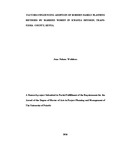| dc.description.abstract | The governments of Kenya together with other stakeholders involved in the
provision of family planning services have put in place various strategies and
policies to increase uptake of family planning services. This is aimed at increasing
contraceptive prevalence, reducing Total Fertility Rate (TFR), reducing unmet
need for family planning services as well as reducing maternal and child deaths.
Despite the various strategies and policies, total fertility remains high at 4.6%
while the national contraceptive adoption level is at 46% far below the projected
rate of 70% by vision 2030 and the unmet need for contraceptive stands at a
national level of 26%. Kwanza division has a low CPR indicated by high maternal
and child deaths. The purpose of this study was to examine the factors influencing
adoption of modern family planning methods by married women in Kwanza
Division, Trans-Nzoia County, Kenya. The dependent variable for the study was
adoption of modern contraceptives by married women. Independent variables
were couples desire for large families, women economic status, community
attitude and women’s close social networks. The study adopted a descriptive study
design. The theoretical framework that guided the study was the Diffusion of
Innovations Theory and the Social Networks Theory. The target population was
28,787. The sample size for the study was 397 married women which was
obtained using the Krecjie and Morgan Table (1970). The sampling procedure
adopted was multistage random cluster sampling. Data was collected using
interview guides. Data was analyzed using frequencies, percentages, multiple
regression, spears rho and presented on tables. The findings of the study will be
important in designing the post 2015 agenda by the government and other
stakeholders involved in provision of reproductive health services in Kenya. The
findings of the study indicate that by taking the coefficient of determination,
couples desire for a large family as a factor contribute 28.4 % variability in
adoption of modern family planning practices also a statistical significant
relationship between economic status and adoption of modern family planning
practices by married women was observed. The study recommends that national
and county governments should strive to improve transition rates from primary to
secondary school to raise the education levels among women which would
promote better understanding of reproductive rights and the benefits of modern
family planning methods by women | en_US |



